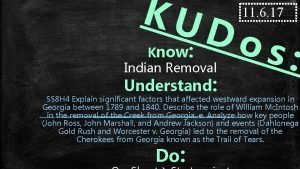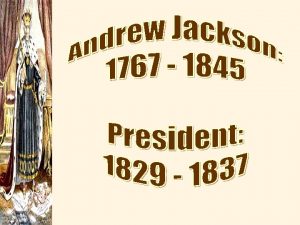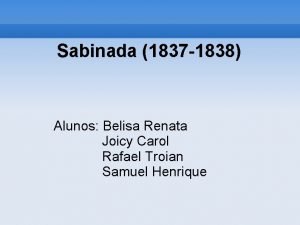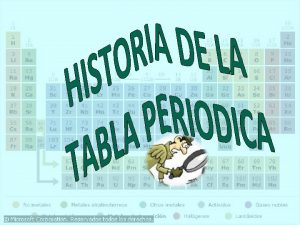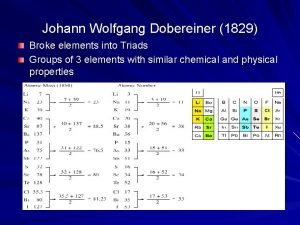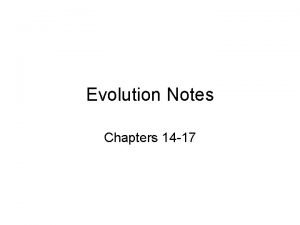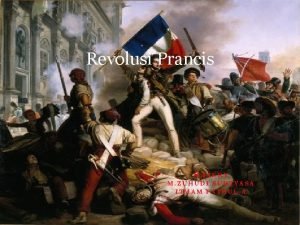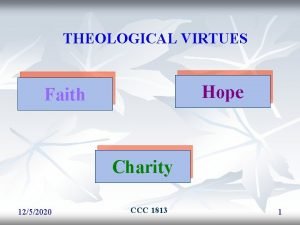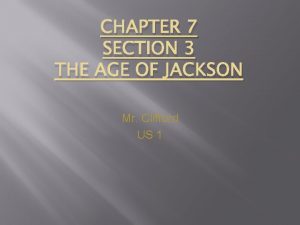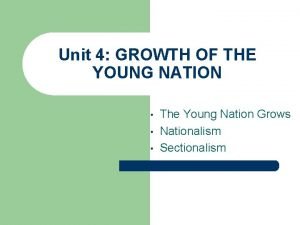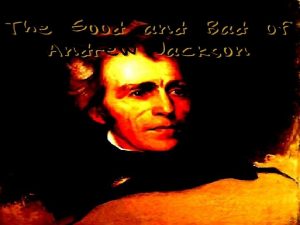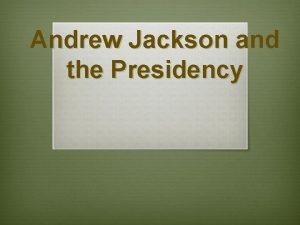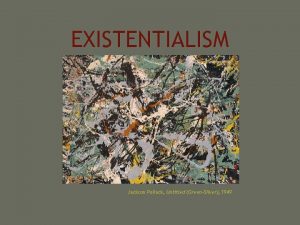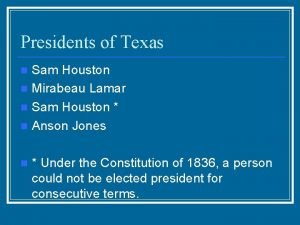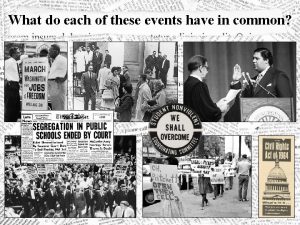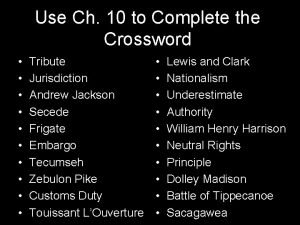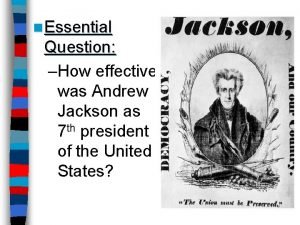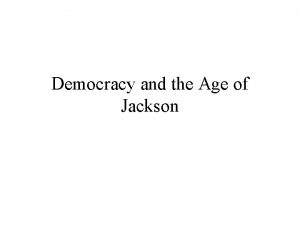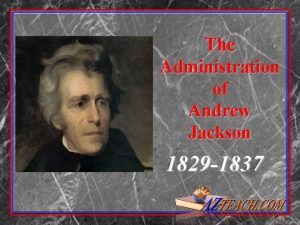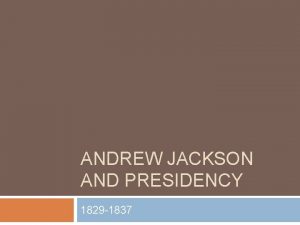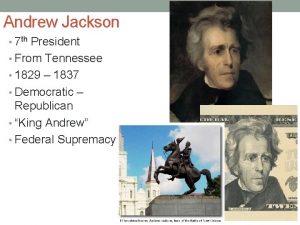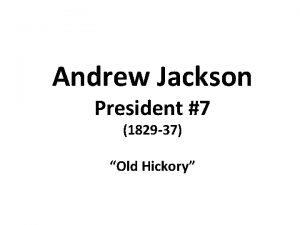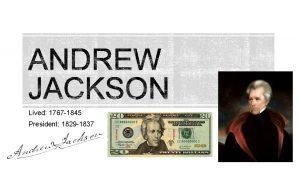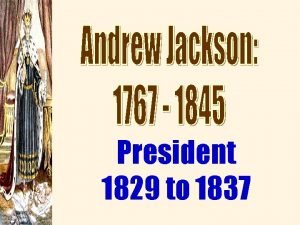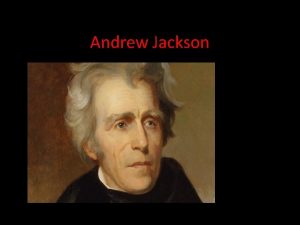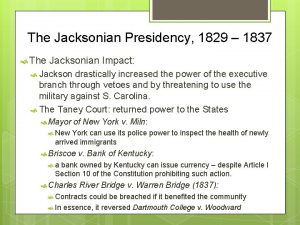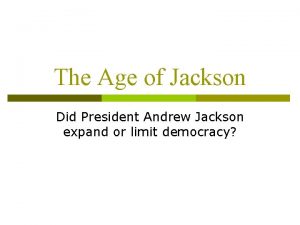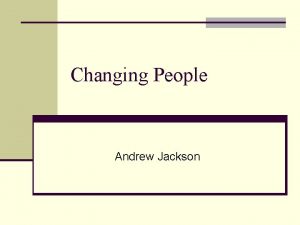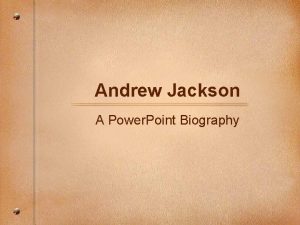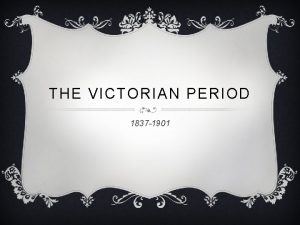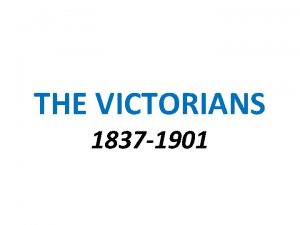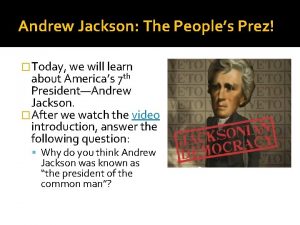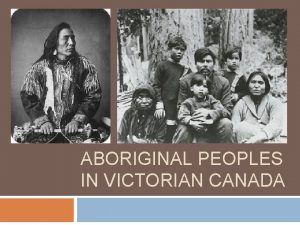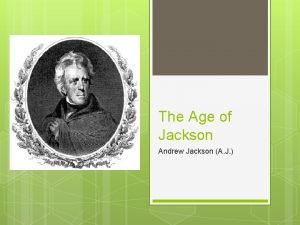Andrew Jackson The Peoples President 1829 1837 Andrew




























- Slides: 28

Andrew Jackson The “People’s President” 1829 - 1837

Andrew Jackson’s backstory • Born poor on a South Carolina farm in 1767. • Mother and two older brothers die during the American Revolution • Hero of the Battle of New Orleans during the War of 1812 • Later fought in Florida during the Seminole and Creek Indian Wars • Nicknamed “Old Hickory” for his stubborn attitude

“Corrupt Bargain” of 1824 • Adams defeats Jackson, even though Jackson had more votes • Broke up the Dem-Rep party and ended the Era of Good Feelings • Formation of Democratic Party • Almost immediately after the election Jackson begins campaigning for the 1828 election

THE ELECTION OF 1828 JACKSON (D) VS ADAMS (R) • bitter & dirty campaign; lots of personal attacks (mudslinging) • Jackson used his popularity as a westerner and the Hero of the Battle of New Orleans and Indian Wars to win votes • The Democratic Party held a National Convention and had a National Platform • Jackson promised to look out for the interests of the common people unlike Adams, a wealthy easterner. • “Jacksonian Democracy”: majority rule, not just rich white men but all white men!

Mudslinging – attacking a competitor personally John Q. Adams created a controversy about Jackson’s wife Rachel. She died just weeks after the election, and Jackson believed the personal attacks were the cause.

1828 Election Results A record number of people voted in the election of 1828, believing Jackson was a man of the people who had their best interest in mind. John C. Calhoun from South Carolina was Jackson’s first vice president

Inauguration of Jackson—Party time!! The White House was open for anyone who wanted. Thousands attended to celebrate the inauguration of President Jackson. It quickly turned into a drunken mob. The White House was left a mess, including several thousand dollars worth of broken china

Jeffersonian vs. Jacksonian Democracy What difference were we seeing between the two? Were Jackson’s critics correct about the type of person he was?

THE SPOILS SYSTEM • Jackson removed 919 federal employees (about 10%) from office and appointed his supporters, family, and friends to government positions– rather than the most qualified applicants. • “To the victor belongs the spoils” • Can you predict any problems with this policy? Jackson also created a “kitchen cabinet” which is an extremely close group of advisors in addition to the regular cabinet.

Indian Removal Act • Gold was discovered in Georgia, fueling the desire for Native American lands in the Southeast • With the pressure from the President, Congress passes the Indian Removal Act – gov’t could exchange Native land in the SE for land West of the Mississippi R • Georgia passed laws to force tribes, especially the Cherokee, off their lands

Worcester v. Georgia • Instead of physically fighting back, the Cherokee did something different – they sued the U. S. government for the right to remain on their land • In a landmark Supreme Court decision Worcester v. Georgia, John Marshall ruled that the Cherokee were a sovereign nation and Georgia’s removal laws were unconstitutional. • Jackson ignored the ruling. “John Marshall made his ruling, now let him enforce it. ”

Trail of Tears Cherokee were forced off their land at gunpoint 4, 000 out of 16, 000 died along the way to the “Indian Territory”

Nullification Crisis • From 1828 - 1832, Congress passed a series of tariffs on imports to help American businesses. • Vice President John C. Chalhoun of South Carolina objected to the high tariffs, because it would hurt Southern exports of cotton. • The south called the it “The Tariff of Abominations”

NULLIFICATION CRISIS • Nullify – to cancel or reject • Doctrine of Nullification: Calhoun argued that South Carolina could nullify the tariff. • What are the consequences of this policy if left unchallenged by Jackson? South Carolina threatens to secede if the tariffs aren’t lowered We hate the “Tariff of Abominations!” We will secede if we cannot nullify it!”

Nullification Crisis Cont’d “If that damned state can nullify federal law, then the union is dead… disunion by armed force is treason!” --Andrew Jackson The Force Bill: empowered Jackson to use the army to enforce the laws of Congress lowers the tariff enough that South Carolina backs down. The compromise was written by Henry Clay. Calhoun resigns as Vice President because of the Nullification Crisis. Jackson would finish his first term without a VP.

1832 Election • Andrew Jackson easily wins reelection 219 electoral votes to 49. • Beating Henry Clary was sweet revenge after the “Corrupt Bargain” of 1824 cost Jackson the presidency that year. • Who did South Carolina vote for? Why?

Criticisms of Jackson – what are his opponents saying here?

Criticisms

WAR ON THE BANK OF THE U. S. § Jackson thought the national bank was too powerful § controlled the country’s money supply § and benefited northern, wealthy, Republicans § “Too much power, too few hands. ” § Therefore, he vetoed the bank’s renewal charter, arguing that the National Bank was unconstitutional. § Jackson redistributed federal money out of the National bank and into state banks, killing the National Bank.

He’s on the $20! • How ironic is it that Jackson is now featured on U. S. money, after he almost killed the National Bank!? !

War on Banks

Assassination attempt In 1833, the first known attack of a president occurred when Jackson was attacked aboard a ship he was sailing on. The President wasn’t harmed and the assailant was caught. In 1835, while attending a funeral at the Capitol Building in Washington D. C. an unemployed man fired two shots at the President. Both guns misfired, and then Jackson beat the man with his walking cane. Davy Crockett, a friend of Jacksons, helped take down the assassin.

Supporting Texas Sam Houston and Andrew Jackson (both from Tennessee) were good friends. They fought in wars together and served both served in politics. After Texas won independence in 1836 Jackson was in favor of annexing the land. He encouraged Texas president Houston to join the U. S. Members of the U. S. government were against annexation because of how big a slave state it would create, and possible war with Mexico.

Panic of 1837 • Financial crisis in the U. S that started in 1837 and lasted through the mid 1840 s. • Profits, prices, and wages went down while unemployment went as high as 25% • Partly caused by Jackson closing the National Bank and distrust of banks in general • Whig party is created to stop Democrats power

Death of Jackson • On the last day of his presidency, Jackson admitted that he had but two regrets, that he "had been unable to shoot Henry Clay or to hang John C. Calhoun”. • After his presidency ended in 1837, Jackson retired to his home The Hermitage in Tennessee. At first he was unpopular because of the Panic of 1837. • In the 1840 s he stayed involved with politics helping the Democratic party, and still pushing for Texas annexation. • Eventually age, and disease caught up with Jackson, and he passed away at the age of 78 on June 8, 1845. • At Jackson’s funeral, his pet parrot had to be removed from the service for cussing.

Legacy of Jackson List of Jackson memorials

The Hermitage today

The Hermitage today
 Was andrew jackson a president
Was andrew jackson a president Election of 1824
Election of 1824 Florence nightingale 1837
Florence nightingale 1837 Movimento bahiense 1837
Movimento bahiense 1837 The three uses of money
The three uses of money Movimento bahiense 1837
Movimento bahiense 1837 Primaveras casimiro de abreu
Primaveras casimiro de abreu 1837-1901
1837-1901 Ducks unlimited president
Ducks unlimited president Que es el caracter metalico
Que es el caracter metalico Vācu ķīmiķis 1829-1896
Vācu ķīmiķis 1829-1896 Dobereiner 1829
Dobereiner 1829 Fossil layers
Fossil layers Catholic emancipation bill (1829), di inggris berisi…
Catholic emancipation bill (1829), di inggris berisi… Ccc charity
Ccc charity Samuel austin worcester
Samuel austin worcester Why did andrew jackson oppose the national bank
Why did andrew jackson oppose the national bank Who is in this picture
Who is in this picture Jacksonianism
Jacksonianism Andrew jackson pollack
Andrew jackson pollack Mirabeau lamar campaign poster
Mirabeau lamar campaign poster Andrew jackson vocabulary
Andrew jackson vocabulary Quotes about the trail of tears
Quotes about the trail of tears What did the sibley commission do
What did the sibley commission do Andrew jackson champ or chump
Andrew jackson champ or chump Andrew jackson crossword puzzle answer key
Andrew jackson crossword puzzle answer key Spoils system
Spoils system Hoover carts
Hoover carts Andrew jackson found his greatest support among
Andrew jackson found his greatest support among
